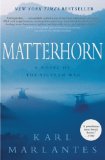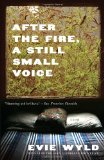Summary | Excerpt | Reviews | Beyond the book | Read-Alikes | Genres & Themes | Author Bio

A Novel
by Biyi BandeleThe King's Rifle has a rather disjointed beginning that readers may find
off-putting. It begins with a prologue that, while based on fact and relevant to
the history of the Chindits, has little to do with the rest of the novel. The
two or three chapters that follow strike the reader as somewhat rambling, with
the narrative touching on multiple subjects, stream-of-consciousness style. It's
a disorderly approach, and readers may have difficulty orienting themselves at
first. It is worth persevering, however, as those who read on will discover both
an exceptional historical fiction novel and a powerful coming-of-age story.
Bandele's background as a playwright is evident throughout the book. Indeed,
much of the novel reads like a play. Most of the action is advanced through
dialogue, and readers come to know "soja" Ali Banana and his cohorts through
their inner musings and their conversations with each other. One of the book's
strengths is Bandele's ability to develop his characters. The reader observes
these disparate individuals mature and form deep bonds with one another, and
again, Bandele accomplishes this through dialog rather than description.
Bandele also does an excellent job of incorporating details that are
well-established fact, such as descriptions of weapons and aircraft, the
85-pound backpacks the Chindits carried through the mountains, and the contents
of the K-ration packs with which they were supplied. Although from time to time
these sections seem a little too encyclopedic, they're often used to provide a
little comic relief as well as to put the reader more fully in the soldiers'
shoes.
"They drank from their chaguls and then settled down to the grim but necessary task of eating their supper. Field Ration, Type K, or the 'K' ration as it was better known, consisting of three meal-packs in one box, was an American invention designed to sustain troops under emergency conditions when no other food was available. It consisted of a fruit bar, a tin of meat and a packet of biscuits which all looked like paper pulp that had been pasted together and tasted like cat food; a pack of purified grape sugar which tasted nothing like grape or sugar and was so revolting even the mules refused to eat it; and a pack of lemonade powder so acidic it worked better as a floor-cleaner than as a drink."
Where descriptive paragraphs are employed to illustrate conditions on a march
or within camp, they are rich and evocative. Some readers may feel, however,
that Bandele relies too much on dialogue and devotes too little narrative to the Chindits'
surroundings. Another criticism that could be leveled against the book is a lack of emotional depth. Readers are left to imagine how these young men
must feel, killing, watching their friends die, and being in constant danger of
being killed themselves. Having said that, this comment comes from the
point of view of an armchair warrior; whereas the story is realistically told
from the perspective of men fighting a guerilla war against the Japanese in the
densest of booby-trapped tropical jungles, who are constantly on their guard
against the enemy. This is not an environment conducive to contemplation,
indeed ones very survival likely lies in not giving way to feelings.
Overall, The King's Rifle is an exceptional work that gains depth as
it progresses toward its compelling and unforgettable dénouement. Bandele's
writing style may not appeal to all readers, but those interested in the story
of this mostly unheralded band of soldiers will want to put The King's Rifle high on their lists.
About the Author
Biyi Bandele is an award-winning novelist, playwright, and director. He was
born in Kafachan, Nigeria, in 1967, the son of a veteran of the Burma campaign.
In 2006 he was named by the UK newspaper The Independent as one of Africa's fifty greatest
artists. He lives in London.
External links & sources:
![]() This review
first ran in the April 1, 2009
issue of BookBrowse Recommends.
This review
first ran in the April 1, 2009
issue of BookBrowse Recommends.

If you liked The King's Rifle, try these:

by Karl Marlantes
Published 2011
A big, powerful saga of men in combat, written over the course of thirty-five years by a highly decorated Vietnam veteran.

After the Fire, a Still Small Voice
by Evie Wyld
Published 2010
Set in the haunting landscape of eastern Australia, this is a stunningly accomplished debut novel about the inescapable past: the ineffable ties of family, the wars fought by fathers and sons, and what goes unsaid.
Your guide toexceptional books
BookBrowse seeks out and recommends the best in contemporary fiction and nonfiction—books that not only engage and entertain but also deepen our understanding of ourselves and the world around us.